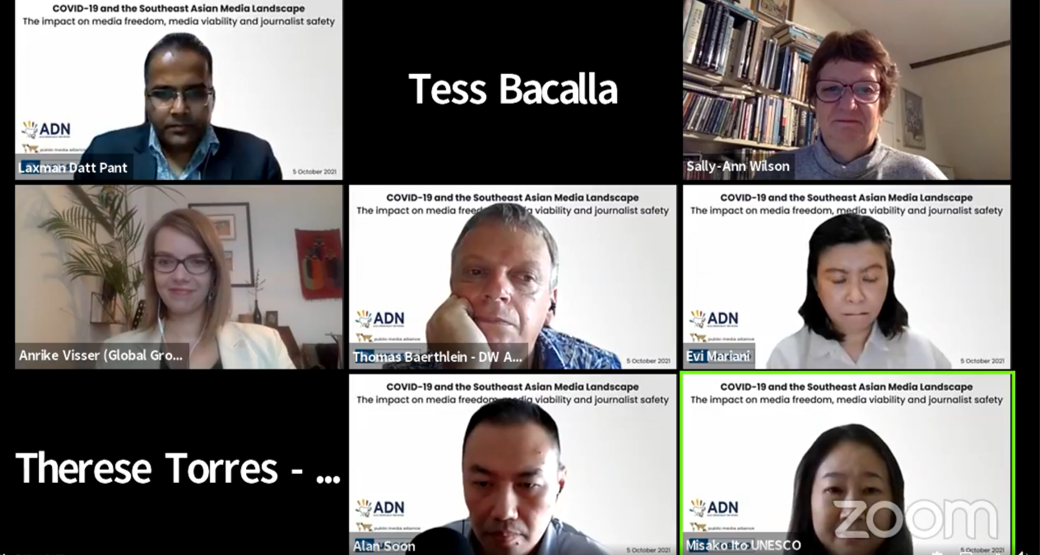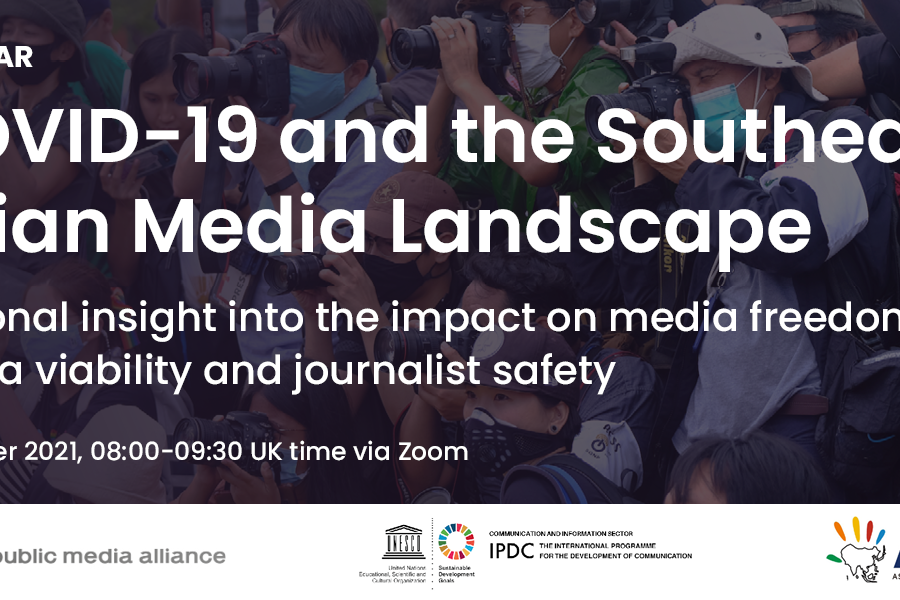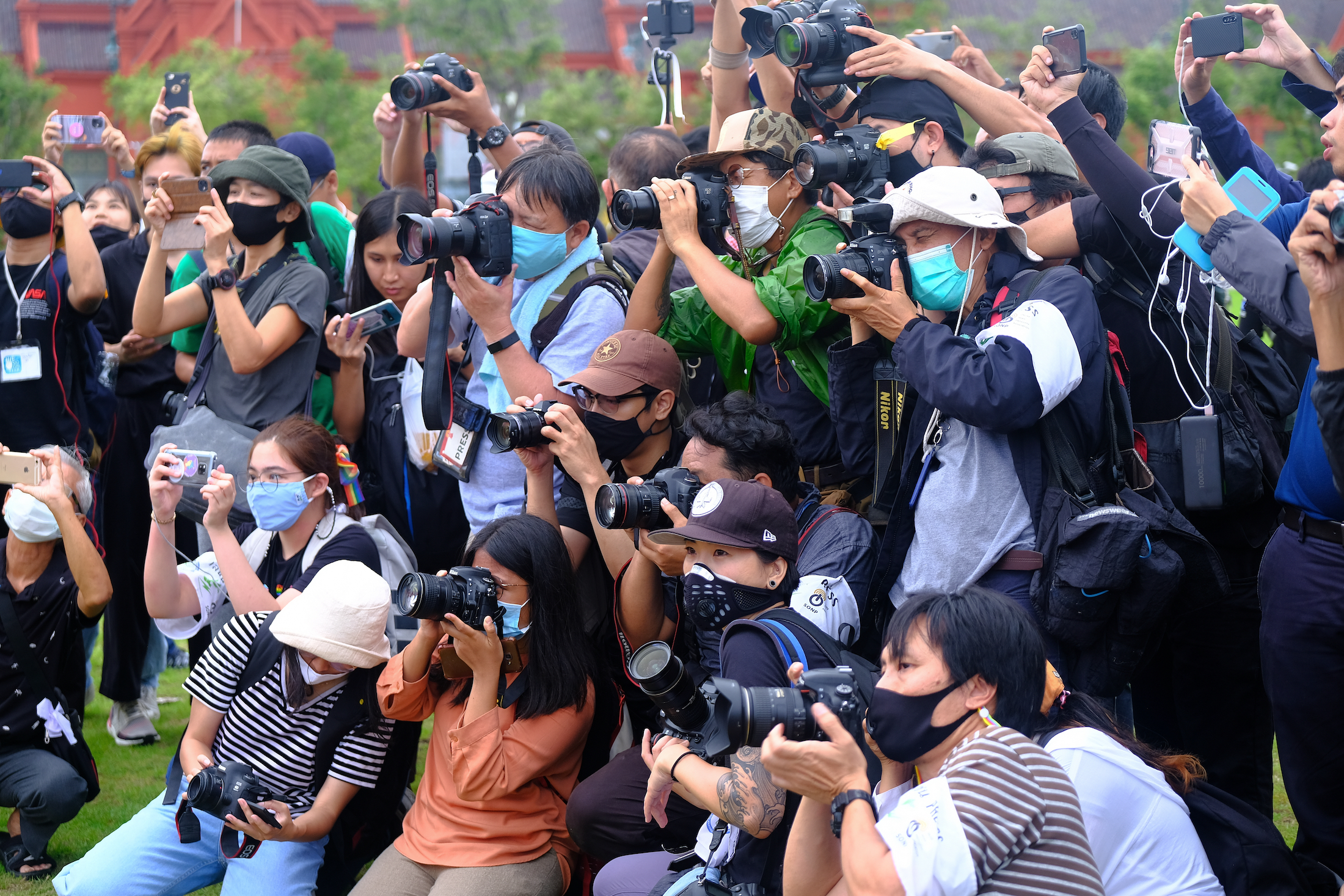Project update
Media experts discuss the impacts of COVID-19 on the Southeast Asian media landscape
Media experts highlight that while the COVID-19 pandemic has exacerbated many of the ongoing challenges facing independent media in Southeast Asia, there are some positive takeaways that may help to regain audience trust and maintain editorial independence.
8 October 2021
On Tuesday, the Public Media Alliance (PMA), in partnership with the Asia Democracy Network (ADN) and with support from UNESCO Bangkok, hosted a webinar to discuss preliminary findings from a regional consultation project exploring the state of media freedom, media business viability and journalist safety in ten countries in Southeast Asia during the COVID-19 crisis. They were joined by media stakeholders from across the region and the project’s country experts to share their insights on the challenges and threats facing journalists and media workers.
In her opening remarks, Sally-Ann Wilson, CEO of PMA, shed light on how news media organisations worldwide were already under significant pressure at the start of the pandemic, and how now, “under what we have termed ‘the cloak of COVID’, we are witnessing a further major impact on the media landscape. This project seeks to assess that impact in Southeast Asia as the first step towards a better understanding of how we can all work together to address the situation.”
#PublicMediaAlliance has conducted research and now is discussing the impacts of #COVID19 on #mediafreedom, #mediaviability, and #journalistsafety in #SoutheastAsia (including #Cambodia) #Covid19KH https://t.co/YXep9mT8sA
— ou ritthy អ៊ូ រិទ្ធី (@ouritthy) October 5, 2021
The project is supported and funded by UNESCO Bangkok and the rapid response mechanism of the International Programme for the Development of Communication (IPDC). Misako Ito, Adviser for Communication and Information from the UNESCO Bangkok office discussed the role of the UNESCO-IPDC programme and the importance of the project for the SEA region as part of its efforts to support media recovery from COVID-19. She said, “COVID-19 has underlined the importance of access to quality and reliable information. During the crisis, independent journalism, reporting on facts through scientific data and analysis, as well as fact-checking, have proved to be a matter of life or death.
“During the crisis, independent journalism, reporting on facts through scientific data and analysis, as well as fact-checking, have proved to be a matter of life or death.” – Misako Ito, Adviser for Communication and Information, UNESCO Bangkok
“But ironically, the pandemic has worsened the pre-existing challenges to the viability of [media outlets] because the economic model was affected by [a] massive loss of advertising revenue, which in turn affected the editorial independence as media became more vulnerable to take over from governments, private sectors or advertisers.” Ito added that, in the past year, public service broadcasting has also been subject to increasing budget cuts, while “journalists and media workers are increasingly working under precarious conditions, which is particularly true for the freelancers.”
The webinar was moderated by the project facilitators, Laxman Datt Pant, Chairperson of Media Action Nepal and Tess Bacalla, Editor in Chief of the Asia Democracy Chronicles, who discussed the progress of the project so far and some of the key findings from the research and regional questionnaire. Alarmingly, nearly half of all questionnaire respondents (30/61 or 49.2%) strongly agreed that the COVID-19 pandemic has increased threats to the safety of journalists. When asked about their own personal safety, many participants (38/58 or 65.5%) denied feeling physically or mentally safe while doing their job during the pandemic and more than half of respondents (33/58 or 56.9%) declared that they have never received any previous type of media safety training.
But despite the bleaker realities highlighted from the research, experts also acknowledged some of the more positive impacts of the pandemic. Alan Soon, co-founder and CEO of Splice Media, a start-up company based in Singapore, which consults on the transformation of media in Asia, believes that “the opportunities we have in media right now outweigh some of the less positive changes.” He alluded to access to more sources for journalists and a wider diversity of opinion, as well as experimenting with new emerging business models and digital innovations to build greater value for audiences.
“… the opportunities we have in media right now outweigh some of the less positive changes.” – Alan Soon, CEO, Splice Media
Similarly, Anrike Visser, co-founder of Global Ground Media and a media viability expert explained that, at a time when independent and critical media are increasingly facing pressures because of their journalistic work, it is vital that media organisations “ensure that trust and independence remain at the forefront” of their work in order to maintain audiences and remain viable. She also advised that media organisations tailor their business models for their audiences; consider memberships; mobile first and studio quality content as well as data analytics.
Sally-Ann Wilson concluded the session by stating that “It is important to remember that audiences are becoming increasingly media literate… Citizen trust is really important to effective media and that is the real power of the media – being trusted, being credible, being accurate and… editorially independent.” Because of this, she is convinced that, along with new media viability models and working more collaboratively, independent media will thrive. However, Sally-Ann concluded, “there is a lot of work to do and there are a lot of journalists that we mustn’t forget need our support.”
“Citizen trust is really important to effective media and that is the real power of the media – being trusted, being credible, being accurate and… editorially independent.” – Sally-Ann Wilson, CEO, Public Media Alliance
The webinar plays a vital part of the project, allowing organisers to better identify key threats and challenges facing media in the region. The final objective of the project is to compile a regional roadmap to address these issues and provide recommendations on how to better equip journalists, media organisations and the wider media environment with practical ways of responding to the challenges during and beyond the COVID-19 crisis.
Related Posts
7th September 2021
Webinar: The Impact of COVID-19 on the Southeast Asia Media Landscape
Register now for our webinar on the…
29th April 2021
Project: The Impact of COVID-19 on Media Freedom, Media Business Viability and the Safety of Journalists in Southeast Asia
Our new project seeks to identify and…



